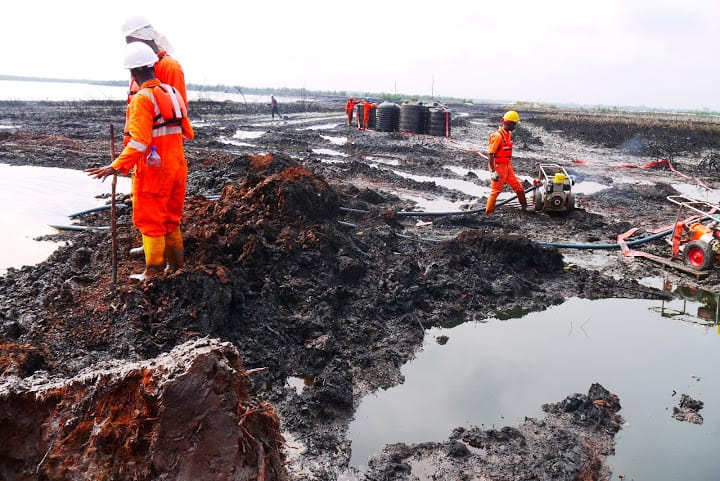As Shell concludes plans to sell its Nigerian onshore subsidiary, The Shell Petroleum Development Company of Nigeria Limited (SPDC), it has been called upon to address all concerns regarding the ecological, health, economic and social impacts of their operations for more than six decades in the Nigeria Delta.
Shell had on Tuesday, 16 January 2024, announced that it had reached an agreement to sell its Nigerian onshore subsidiary, SPDC, to a consortium of domestic and international oil companies for a total net fee of $2.8 billion.
Join our WhatsApp ChannelREAD ALSO: Shell To End Nigerian Onshore Oil Operations, Seals $2.4bn Deal With Renaissance Africa Energy
The British oil major said it would be exiting onshore oil exploration to focus on deepsea/offshore frontier of the upstream sector in the West African country.
The deal of SPDC asset sale to Renaissance Energy Africa, a consortium of five companies comprising four exploration and production companies based in Nigeria and an international energy group, is subject to approval by Nigeria’s Federal Government.
However, a joint statement by a group of environment activists raises concerns about the ecological, health, economic and social impacts of Shell’s activities in the Niger Delta that need to be properly addressed before such a deal is concluded and asset handed over to the new set of owners.
The joint statement was signed by Nnimmo Bassey, Health of Mother Earth Foundation; Ken Henshaw, We The People; Akinbode Oluwafemi, Corporate Accountability & Public Participation Africa; Emem Okon-Kebetkache, Women Development and Resource Centre; Tijah Bolton-Akpan, Policy Alert; and Stephen Oduware, Niger Delta Alternatives Convergence.
While the group acknowledged that businesses like Shell have the right to dispose of their assets as they deem fit, they expressed concern about the manner in which the transaction is being carried out, without taking into consideration the plight of host communities in the Niger Delta region who have continued to suffer environmental degradation, deteriorating health conditions due to pollution, and loss of economic resources as a result of indiscriminate hydrocarbon extraction.
They contended that it’s against the cause of ecological justice for talks about the deal of asset sale to be concluded between Shell and the consortium without engaging the host communities where the energy company has been operating for years.
The statement said: “As civil society organisations in Nigeria who have worked in the Niger Delta in the context of oil and gas extraction and its attendant ecological, economic, social and health impacts, we have keenly observed the scheming by Shell to sell off its onshore assets in Nigeria despite clear protestations by communities and civil society organisations.
“This transaction follows similar moves by Chevron, Total-Energies, and ExxonMobil to sell off ‘oil assets’ in the Niger Delta.
“Shell has persistently engaged in irresponsible and reckless hydrocarbon extraction practices resulting in severe ecological, health and economic consequences. Multiple inquiries have determined that the corporation and its associates are responsible for causing environmental destruction that has devastated people’s means of living, contaminated communities, and facilitated situations that violate human rights.”
The group pointed out that while Shell continues to deny its role in the ecological disaster in the Niger Delta, assessments by reputable organisations such as the United Nations Environment Programme (UNEP), and the Bayelsa State Environment and Oil Commission among others have indicted the oil company of being responsible for environmental pollution in the region.
“Given the well-established social, health, economic, and ecological impacts of Shell’s operation, it is inconceivable that the company intends to merely sell its holdings and go. The selling of assets by Shell and other oil multinationals is easily an effort to evade accountability for the long-standing damages caused by oil extraction in the Niger Delta.
“It is pertinent that Shell owns up to its responsibility for the ecocidal damage of territories they have exploited. This means full payment for the remediation and restoration of the polluted areas as well as reparations to the host communities. They cannot walk away from the grave and irreparable harm they have caused,” the activists stated.
They also lamented that in the midst of the whole environmental misfortune in the region, the Nigerian government and its regulatory agencies have failed to come up with a guide, policy or blueprint establishing the conditions and modalities for oil company divestments. “Divestments, including the latest by Shell, have happened haphazardly and in manners solely determined by oil companies, paying little or no attention to the broader ecological, economic and social impacts that their activities have bequeathed to communities,” they said.
The group therefore made the following recommendations:
“The federal government should immediately place a moratorium on all oil company divestment (or sale of assets) in the Niger Delta, pending the ascertaining of issues of community concern.
“The federal government to immediately produce a framework and guide for how oil companies disengage from areas where they have operated. This guide should be developed by a multi-stakeholder group including communities and civil society organisations.
“The divestment (or sale) framework must contain the following requirements for oil companies and the Nigeria authorities.
“A scientifically developed post-hydrocarbon impact assessment report establishes the exact ecological and livelihood impacts of oil extraction.
“A health audit of people located near extraction sites, and others exposed to oil contamination and gas flaring. This audit will aim at unraveling the negative health impacts of exposure to hydrocarbons.
“A detailed plan and costing for remediating the ecological, livelihood and health impacts of extraction.
“The establishment of independent frameworks for remediating all identified impacts and compensation to the impacted individuals and communities.
“Posting of funds in a designated account commensurate for the cleanup of impacted ecosystems and restoration of livelihoods.”
Victor Ezeja is a passionate journalist with seven years of experience writing on economy, politics and energy. He holds a Master's degree in Mass Communication.







![Breaking: Tinubu Returns To Abuja After Europe Trip [Photos]](https://www.primebusiness.africa/wp-content/uploads/2025/04/Tinubu-returns-to-Abuja-Pohotos-2-720x480.jpeg)











Follow Us